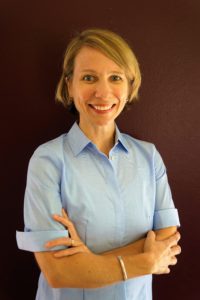
Karin Wachter
Karin Wachter is a 2016 recipient of our Moore Fellowship, a $20,000 award for doctoral students at UT Austin in support of research on the human experience of crises.
Wachter’s dissertation, titled “Women’s Social Support in War, Displacement, and Post-Resettlement,” is adding to our knowledge about how women adapt and maintain social support networks in times of upheaval such as war and forced migration.
The forced movement of people, whether displaced within their own countries or across national borders, is a pressing concern for states and humanitarian organizations. Regardless of the cause, displaced people face a need for protection and support.
But research is also needed. For Wachter, an understanding of women’s experiences in forced migration is one path to a deeper understanding of displaced people and how humanitarian efforts can better serve them.
“The overarching question I sought to answer was: What are women’s experiences of social support in forced migration, the dynamics that shape and impact their experiences, and the factors that enable or impede their ability to maintain or recreate social support networks?” Wachter said. “In essence, I seek to bring to the forefront aspects of women’s experience of forced migration that gets less attention in the literature and in practice.”
Wachter was deeply influenced by her ten-year career in humanitarian assistance. Most of her work was in African countries impacted by war and mass displacement. This includes refugee and internally displaced camps in the Democratic Republic of Congo (DRC), Chad, Ethiopia, Uganda and Tanzania.
“When I came to the University of Texas at Austin to pursue my doctoral studies, I quickly came to appreciate the fact that Texas was one of the largest refugee resettlement sites in the country, and I realized that I would be able to put my professional background and lived experience to use here,” Wachter said.
The ultimate impact of Wachter’s work is to bring into focus aspects of women’s experience that are often overlooked in policy and practice. These include:
- How social support shapes women’s experiences, well-being and sense of self
- How the dynamics of forced migration can rupture connections at multiple levels—including humanitarian interventions to save lives
- How making women’s social support networks more visible to practitioners, policymakers and researchers can lead to improvements in service delivery
“We may not fully appreciate or adequately recognize the severity of psychosocial impacts because we go about our lives quite differently compared to folks arriving from the DRC, and elsewhere,” said Wachter.
A key part of the Hogg Foundation’s strategic direction is promoting new learning about how communities show resilience in the face of traumatic events—including disasters such as climate change, famine, war and disease outbreaks. With its focus on displaced women, Wachter’s work is making an important contribution to that understanding.
Wachter is now an assistant professor of social work at Arizona State University. She credits the Moore Fellowship with playing a pivotal role in her growth as a scholar and person.
“The dissertation process had a profound impact on me—personally and as a researcher, educator and advocate,” said Wachter. “This work has already shaped new research initiatives underway and my conversations with practitioners who work with displaced women.”
Learn more about the Moore Fellowship.
